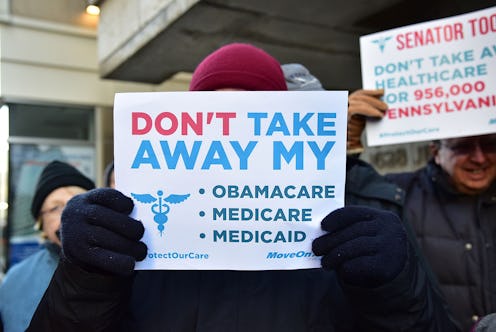Life
3 Scientific Benefits Of Universal Healthcare

Like many people who hail from other countries, I find the complexities and moribund expenses of American healthcare shocking. You have to pay what for an ambulance trip? How many people don't have health insurance?!
Universal healthcare is a good idea. Period. In America the closest you've got to it recently has been the Affordable Care Act (and which, under President Trump, will likely disappear into the ether). And this isn't just an opinion: science has shown, and continues to show, a strong relationship between universal healthcare and excellent outcomes for the people who have it. And I'm not just talking about improved overall health — studies show that universal healthcare also improves communities, and helps us fight back against some major cultural inequalities.
Leaving aside the political points, research into universal healthcare should interest us — and not just because it gives us new ways to argue with Uncle Bob at Easter dinner (although there is that). Although the emotional and political reasons we want universal healthcare are extremely important, quantifying the research-proven reasons why universal health care actually improves our world helps us argue and protest more effectively, and better understand how to put our position out into the world. Simply put, these facts can help us fight back.
It Draws Communities Together
One of the benefits of universal healthcare appears to be less about health directly and more about community feeling, according to new research out this month. The study, conducted by researchers at Vanderbilt University, focused specifically on the Affordable Care Act, examining what a higher or universal level of insurance did to the community feeling of those who had it. They surveyed nearly 1,200 adults in different areas around LA, and found that having healthcare was linked to an increase in their sense of "community cohesion" — shared goals, trust in their neighbors, reliability, and sense of community obligation. The disparity was pretty notable, and the researchers took into account racial and socio-economic factors that could have skewed the findings; they found that, across the board, where there wasn't health insurance spread widely across a neighborhood, feelings of community cohesion dropped by up to a third.
They concluded that this was probably a cause-and-effect thing. They said that it all added up: "lacking health insurance is bad not only for one’s health but also for community life."
It Makes Us More Equal
In private healthcare systems, the ties between being uninsured and various socio-economic categories — particularly racial and ethnic ones — are pretty prominent. The good news? Universal healthcare seems to iron out those divides a bit, helping everybody get access to more services. Two studies bear this one. One, conducted in Nova Scotia in the '90s, found that universal coverage "ameliorates the socioeconomic differences in mortality;" in other words, it helps make up for the big gap in health between the haves and the have-nots, particularly when it comes to death.
But another, published in 2015 by the University of Maryland, focused particularly on the ACA in the States, and found that it increased health care for African-Americans and Latinos in particular, and that they were now "more likely to visit a primary care doctor and receive timely health care." The ACA is still in its infancy (and may soon not exist any more), so seeing how it's helped reduce socio-economic disparities in health long-term can't happen just yet. This data seems hopeful — but taking away the ACA may do away with any positive gains and leave us back where we started. Which, you will agree, sucks.
It Makes Us All Healthier
This is the really interesting thing: universal healthcare, according to the evidence, seems to lift up everybody's general level of health. There's a lot of solid evidence that being insured is better for people's health, particularly for those who are vulnerable to health problems in general (veterans, for instance, and people with HIV). And a massive review of data published in 2015 found some pretty significant evidence that universal healthcare is a good idea for health outcomes. It looked at 153 countries between 1999 and 2008, and the results, the researchers said, "strongly indicate that expansions in health system coverage through higher publicly pooled spending lead, on average, to improved population health measured by lower child and adult mortality rates."
However, the review of data pointed out that universal healthcare's effectiveness depends on something else, too. "The quality of governance and national institutions (stability of the political system, degree of public sector accountability and so forth) may influence the effectiveness of public spending," the researchers said, adding universal healthcare benefits for pregnant women and babies in particular "may be larger in better governed and more equitable countries." So it's not all about getting an Affordable Care Act for all; it's also about making sure that the country that implements it has other desirable attributes to make it all work smoothly.